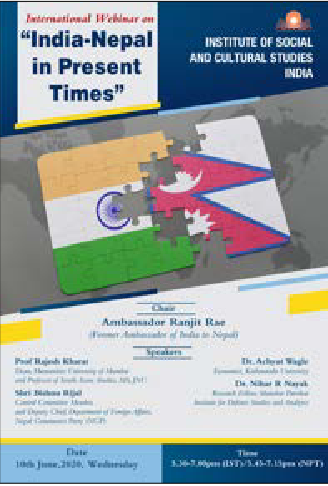Institute of Social and Cultural studies(ISCS),India that had been addressing contemporary issues an development ideas over publications and diversified activities and events, in the view of given situation had hosted an International Webinar on “India-Nepal in Present Times” with eminent speakers of neighbouring India-Nepaon 10th of June 2020.
The event kicked off with a welcome address by an ISCS project consultant and further the Chair of the Webinar Mr. Ranjit Rae, who shared a sketch of the present situation with the participants of the Webinar. He reviewed the world crisis due to outbreak of COVID-19 through statistical facts and figures along with intractable political issues and geo-political disputes over SAARC region that are posing a threat on international relations at the moment. . Prof Rajesh Kharat illustrated that how India-Nepal relations has been challenged in recent times. Over his deliberation Prof. Kharat highlighted some of the previous beneficial bilateral relations that the countries have shared but despite of all that why suddenly all the tensions have emerged between the nations who fondly consider as brothers. He further added that in order to resolve the tension the countries have to address some unresolved previous issues , without an ill feeling towards each other.
Secondly measures are to be defined to empower the border communities that includes citizen of both the nation and the diasporas through eco-tourism and religious tourism. Taking the thread forward Prof Achyut Wagle from Nepal addressed the Webinar narrating Nepal and India enjoy deeply shared ties since time immemorial in every possible facet of their national lives; be that civilization, culture, economy, open border, nuptial exchanges, river systems and so on. Nepal throughout its 252- year long modern history was never colonized and remained a single sovereign country in the entire South Asia when the rest of the subcontinent was colonized. This has shaped country’s pride, culture and people’s behavior to a great extent.
The bilateral relations in modern history were established in 1950 through a friendship treaty following India’s independence from British colonialism. The two countries enjoy three parallel streams of relations; namely at government-to-government, business- to-business and people-to-people. Interestingly, the nature of relations at G-to-G level, which may face hiccups at times, barely seem to have impacting on other two levels of interactions and exchanges even during uneasy times. An unresolved Limpiyadhura,-Lipulekh,-Kalapani border issue between Nepal and India has once again taken a center stage and the bilateral relations, at least at the official levels,
face momentary hiatus. At times, misrepresentation, misunderstandings and misdemeanors may cause such hiatus even in best of diplomatic relations. But they only warrant a continuous and meaningful engagement by both sides to resolve them, sooner the better, as for the countries like Nepal and India bound by similar fate and geography have no alternative to maintain best possible friendly relations in the interest of their countries and people. Mr. Nihar Nayak from Indian side outlined that since last 20-25 days the Nepal-India relations have become dire in public eye.
He classified 10 main features between Nepal-India relations like open border phenomena, political system, democratic features, political asymmetry, external power and their takes, long lasted monarchy system, landlords vs tragedy, emotions and sensitivity and unresolved bilateral relations. . His deliberation also smacked the possibilities of Chinese intrusion in the given situation and thus his views hemmed on the fact that as a way forward measure both nations should start the dialogue on a foreign secretarial level and try and maintain
amicable relation in future. .BishnuRijal who has been a last speaker clearly defined that India has to change certain perceptions first the nation has to be vocal with Nepal in resolving territorial issues along fighting with COVID-19 .As it has been doing with other countries over virtual G-20 summit and SAARC summit. Secondly the country has to respect and recall the contributions of Nepal towards India during Kargil times and several other times of crisis.
India’s ignorance towards Nepal and embedded ideology that Nepal has been a recipient due to India has to be evolved , rather countries now need to sit across table and retrospect about long pending issues and sketch sustainable development road maps over tourism and enrichment campaign. Also discarding idea of China involvement in current dispute. As per his takes if countries continuation of disputes over geo-political reasons will accord countries like China and others to take advantage of given situation. An insightful Webinar signed off itself with all the speakers and the Chair holding on to the same tune and urging the countries to immediately start a dialogue at foreign secretarial level to resolve the existing conflict. Secondly focus on financial arrangements, display and weave strategies to promote economic opportunities for border communities, focus on commonalities and try to build a mutual , sensitive relations between countries that had been each others development partner for 330 yrs or more.





